With municipal elections taking place in October 2024 in Brazil, this report analyses how the city of Porto Alegre’s mayoral candidates are addressing the climate crisis. With already existing environmental challenges exacerbated by climate change, the city was recently hit by some of the most severe floods in its history. Hence, it is crucial to understand how the leading candidates discuss climate-related subjects and observe whether the topic is a priority during the first two weeks of their election campaigns.
Key findings:
- The floods in Porto Alegre were catastrophic, seriously damaging the city’s infrastructure and displacing thousands, so discussions about the floods have dominated the online discourse of Porto Alegre’s mayoral candidates, with 41 per cent of their posts addressing this issue. This indicates a significant focus on environmental disasters, although other topics, such as national politics and municipal policies, have also been prominent in their communications.
- The volume of climate-related posts peaked after the initial floods hit Porto Alegre, demonstrating that candidates prioritise environmental issues when they are most immediate. That attention to these issues appears to have declined once the immediate impact of the floods subsides, however, reflecting a reactive, rather than proactive approach to climate policy discussions.
- The volume of posts addressing environmental issues has varied among candidates, with Sebastião Melo of the Brazilian Democratic Movement (MDB) posting the highest percentage of climate-related content. This underscores the candidates’ differing emphases on climate change and flood response.
- In the first two weeks of the official election campaign, however, there was a notable decrease in posts about floods and climate-related issues, as compared to other topics. This trend suggests that, while climate issues are crucial during crises, candidates address them opportunistically, likely in response to immediate public concern, rather than to a sustained commitment. Such a reactive, rather than proactive, approach indicates that discussions on climate response are seen as politically advantageous in the immediate aftermath of floods, but are not prioritised as a long-term agenda item in the candidates’ online campaign strategies.
Methodology
This report examines the online political discourse of mayoral candidates in Porto Alegre, the capital of the state of Rio Grande do Sul, in Brazil. We analysed which topics the candidates have addressed since the beginning of 2024, explicitly observing the debate surrounding climate-related issues, considering the recent floods that affected the city.
Using quantitative and qualitative analysis methods, we analysed Instagram posts from four mayoral candidates from 1 January to 31 August 2024. Researchers used a social media listening tool, FanPage Karma, to collect data from Instagram.1 We collected 2, 149 posts shared on the platform by the four leading candidates: The incumbent, Sebastião Melo (MDB), Felipe Camozzato, of the Novo Party, Juliana Brizola, of the Democratic Labour Party (PDT), and Maria do Rosário, of the Workers’ Party (PT).
For the quantitative analysis, we employed two primary methods for interpreting the posts: (i) topic modelling, a technique that allows us to match words found in Instagram comments to their probability of association with broader topics, and (ii) volume analysis, comparing the number of climate-related posts to that of overall posts. For every quantitative analysis, we performed qualitative checks and interpretation of the data.
The Climate Crisis in Porto Alegre
- The floods that hit the state of Rio Grande do Sul in April 2024 were devastating, particularly in Porto Alegre. In May, the level of Lake Guaíba reached 5.37 metres in the centre of the capital, surpassing several historic floods in the city. Entire neighbourhoods were submerged, forcing the evacuation of thousands of people, and causing extensive damage to infrastructure. The city faced a collapse in power and water supplies, with areas cut off and main roads blocked, and with 160, 000 people being directly affected by the biggest flood in the capital’s 252-year history. These events intensified the discussion about the need for improvements to flood protection structures, which had already been highlighted in previous discourse, but had received little investment in recent years.
- The “Brazil 2040” report predicted such a disaster, warning of increased rainfall and the greater frequency of extreme events in southern Brazil due to climate change. The report recommended implementing warning systems and adapting infrastructure, especially in urban areas like Porto Alegre. Many of these preventative measures were not effectively put into practice, however, contributing to the severity of the damage during the recent floods.
- The floods of 2024 left a legacy of material and human loss, reinforcing the urgency of climate adaptation actions. Experts emphasise that it is essential to overhaul the city’s drainage system and strengthen the city’s dykes, so that Porto Alegre and other areas of the state are better prepared for such future events.
- In the context of the 2024 municipal elections, mayoral candidates started their political campaign on 16 August. During the first live television debate, the floods and the local and national response to the disaster dominated the exchanges among the candidates.
- This report observes to what extent the candidates have discussed these issues in their online communications, specifically on Instagram.
2024 Municipal Elections: Main Topics Discussed by Porto Alegre’s Mayoral Candidates since January 2024
- As of October 2024, Porto Alegre’s municipal elections featured various candidates, representing various political ideologies and parties. This analysis focuses on the leading four mayoral candidates.
Table 1: Mayoral Candidates’ Profiles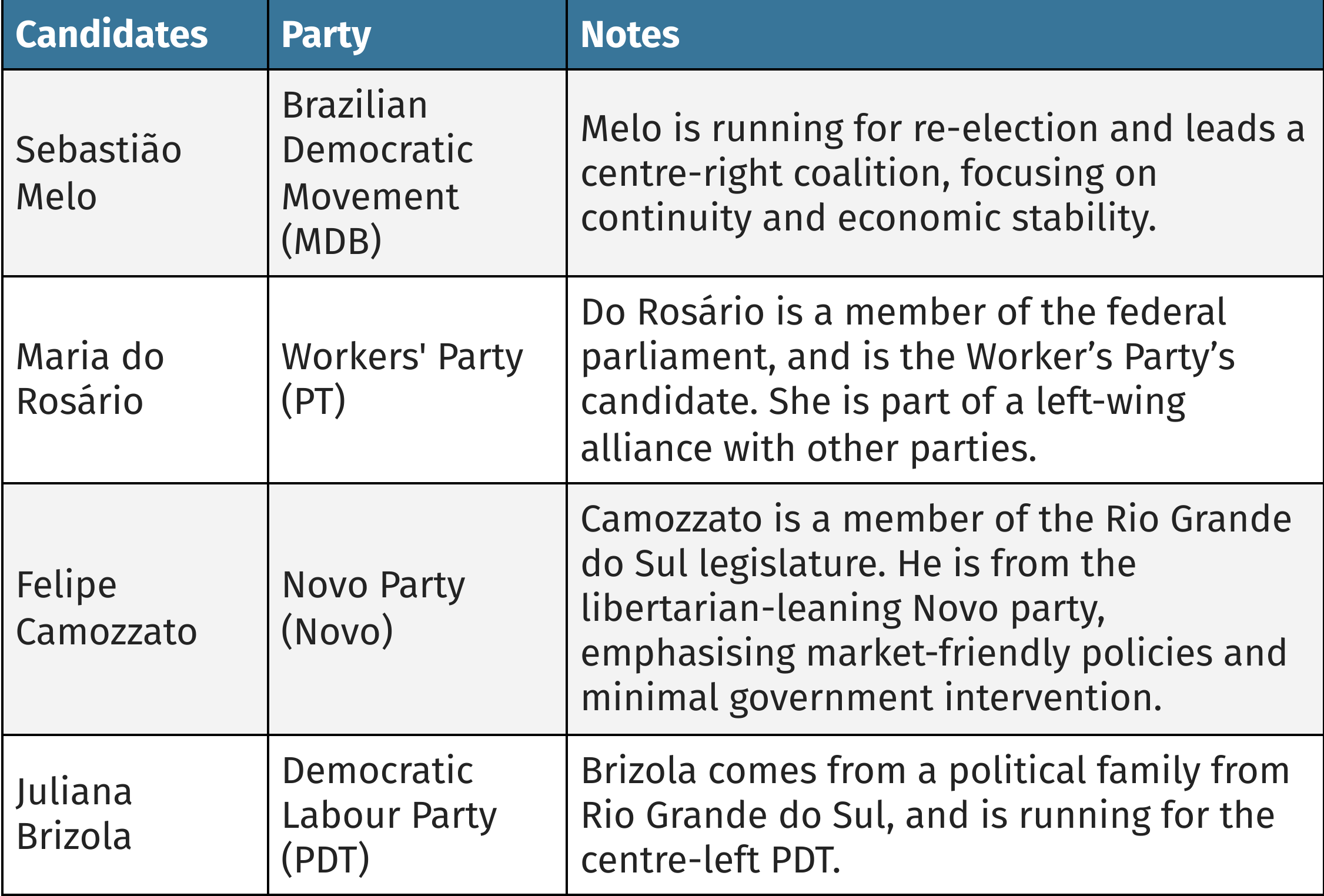
Elaboration: Democracy Reporting International
- In the first part of the analysis, we examined the volume of posts from the mayoral candidates between 1 January and 31 August 2024. The graph below shows the total number of posts per candidate on Instagram. We can see that Rosário (PT) was the most active candidate, with 1, 070 posts on Instagram, while the others had around 200-400 posts during the analysed period.
Graph 1: Number of Posts per Mayoral Candidate from Porto Alegre on Instagram
Data Source: Instagram Elaboration: Democracy Reporting International
- For deeper insights, we ran topic modelling on the dataset, to understand the main issues covered by these candidates, and the extent to which climate-related posts were part of their political communications.
Graph 2: Main Topics Discussed by Mayoral Candidates from Porto Alegre
Data Source: Instagram Elaboration: Democracy Reporting International
- As demonstrated in a previous analysis by DRI, municipal elections represent an essential opportunity for candidates to consolidate or recapture influence and support in their regions. Topics such as national politics and the economy, and issues such as public health and education significantly impact local elections in Brazil.
- Graph 2 displays the main topics and sub-topics discussed by Porto Alegre mayoral candidates. The analysis shows that posts regarding the floods were predominant throughout their communications, totalling 883 posts (41 per cent), followed by various other topics, such as debates on national politics (423 posts, 19.7 per cent) and on municipal policies on specific issues (352 posts, 16.3 per cent). Others covered miscellaneous subjects (491 posts, 23 per cent).
- When debating “floods and climate-related issues”, the candidates most often posted content with: (i) solidarity messages, writing about hope for a better future and a prosperous, rebuilt city; (ii) flood warnings, advising the population in affected areas to leave their homes; (iii) comments about the federal government’s actions towards supporting the city administration; (iv) messages that directly attributed the disaster to climate change; and (v) posts regarding public security and available shelters for displaced people.
- Candidates also focused on national and municipal politics in their Instagram posts. While the posts usually supported or criticised the current federal government on national issues, the local discussions were more specific, including topics such as public education, women’s rights, urban mobility, and public health being predominant.
- The category “miscellaneous” encompasses posts on specific holidays (Mother’s Day, Carnival, Labor Day, etc.), personal posts on the candidates’ private lives, and posts highlighting their decision to run for mayor in the municipal elections.
- When observing the distribution of these topics over the last months, we saw that climate-related posts peaked after the first floods hit Porto Alegre, as would be expected. Graph 3 shows that candidates prioritised the debate around environmental issues and the floods over other topics in the months immediately following the floods.
Graph 3: Topic Distribution Over Time
Data Source: Instagram Elaboration: Democracy Reporting International
- Interestingly, the discussion around floods and other climate-related issues diminished once the political campaigns officially started, on 16 August. In the next section, we will dive deeper into the candidates’ communications around these topics in the first two weeks of campaigning.
Presence of Climate-Related Posts in the Online Discourse of Porto Alegre’s Mayoral Candidates
- In this section, we will explore the floods and climate-related topics in greater detail, to determine how candidates have discussed them since the beginning of 2024, after which, in the next section, we will dive deep into these communications during the first two weeks of political campaigning (between 16 and 31 August).
- As previously shown, overall, posts about the floods dominated the online communication of the four leading mayoral candidates. When examining their communication individually, however, we observed that climate-related posts prevailed for none of them. Graph 4 shows that climate-related posts were not the most prevalent for any of the candidates.
- Melo (MDB), the current mayor of Porto Alegre, had the highest percentage of climate-related posts (270 of 424 posts, almost 40 per cent), followed by do Rosário (PT), who had the highest number of posts overall (1, 070), but of which just 416, just under 28 per cent, were climate-related, and Brizola (PDT), with nearly around 28 per cent of her posts (111 of 291) discussing the floods and climate-related issue. The candidate with the lowest percentage of posts discussing these issues was Camozzato (Novo), with only 76 of his 364 total posts, (around 17 per cent) related to this topic.
Graph 4: Volume of Each Candidate’s Climate-Related Posts, Compared to Overall Posts
Data Source: Instagram Elaboration: Democracy Reporting International
- When breaking down their climate-related posts, we observed that, with the exception of Melo (MDB), all of the candidates posted messages of solidarity and rebuilding the city as their primary content within all climate-related posts.
Graph 5: Volume of Each Candidate’s Posts addressing Environmental Issues
Data Source: Instagram Elaboration: Democracy Reporting International
Solidarity and Rebuilding the City
- Overall, “solidarity and rebuilding the city” was the most common focus, indicating its importance in the climate-related discourse among the candidates. The posts addressed the floods, with messages of solidarity with the affected people and families, and shared messages of hope for collective efforts to rebuild Porto Alegre.
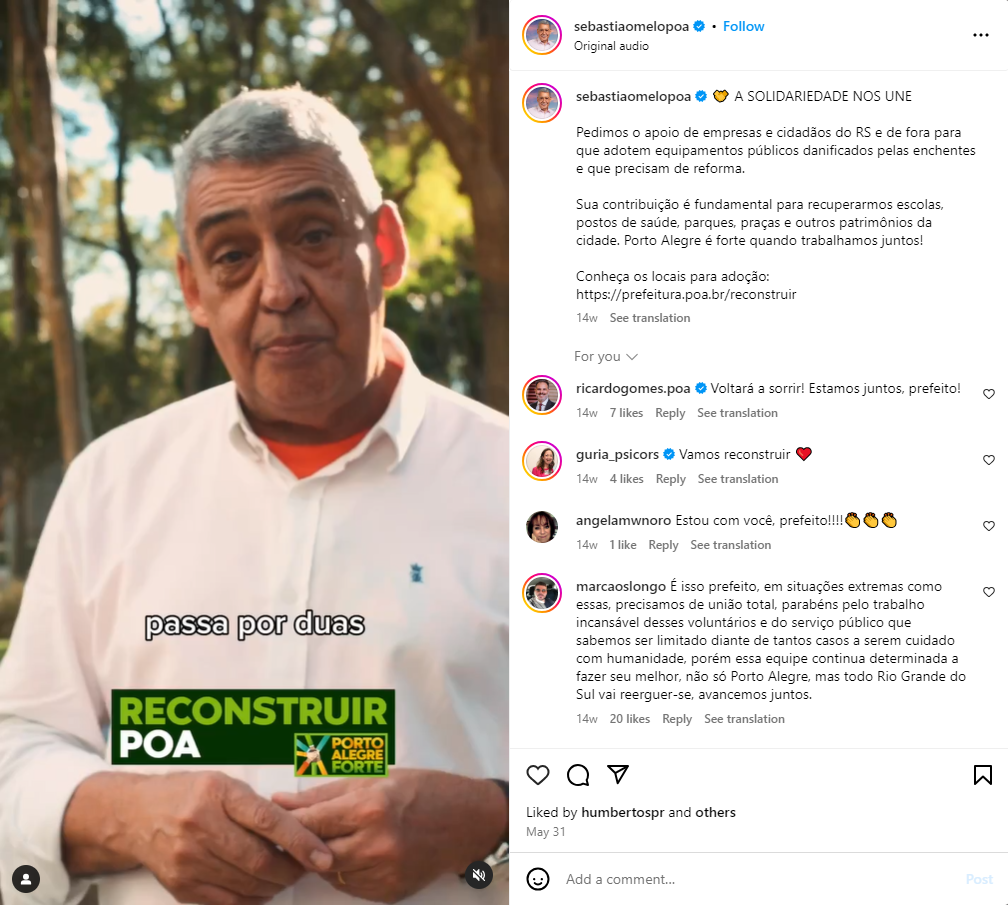
Post from Sebastião Melo on Instagram on 31 May 2024. Caption:
“SOLIDARITY UNITES US We are asking for the support of companies and citizens from Rio Grande do Sul and abroad to adopt public facilities damaged by the floods and in need of renovation.Your contribution is essential if we are to restore schools, health centres, parks, squares, and other city assets. Porto Alegre is strong when we work together! Check out the locations for adoption: https://prefeitura.poa.br/reconstruir.”
Data Source: Instagram Elaboration: Democracy Reporting International
______________________________________________________________
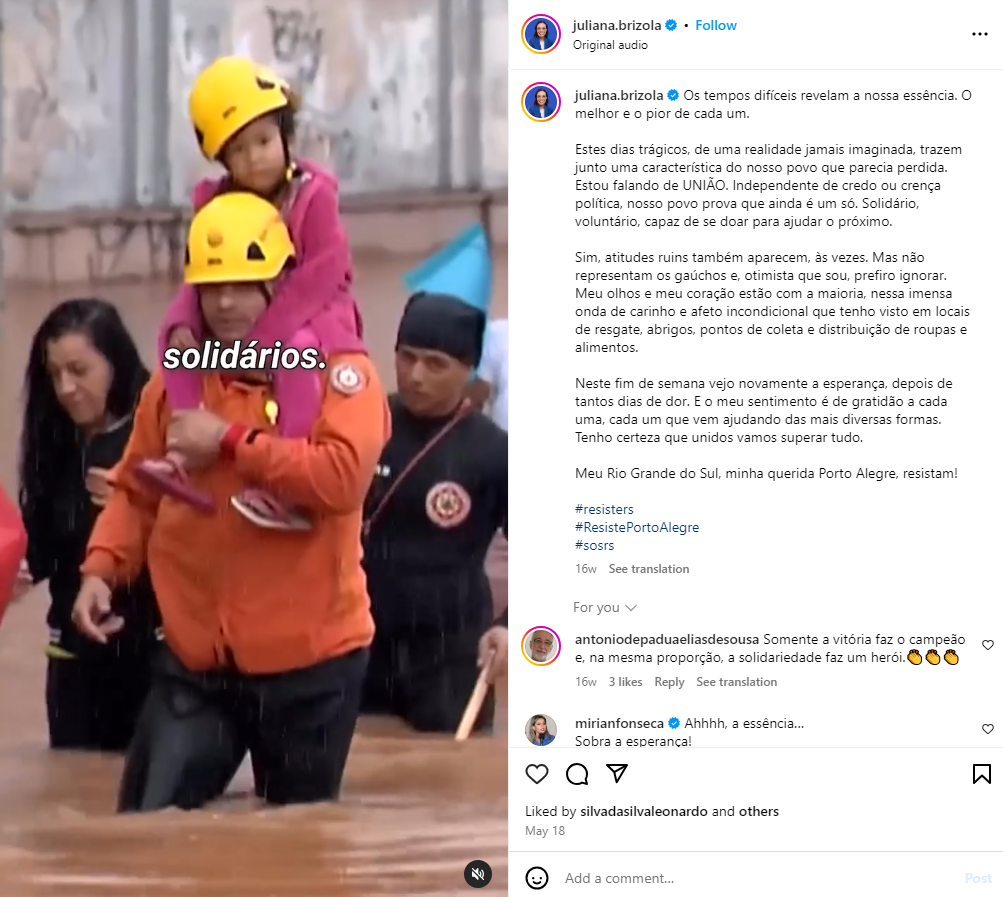
Post from Juliana Brizola on Instagram on 18 May 2024. Caption:
“Difficult times reveal our essence. The best and the worst in each of us.These tragic days, of a reality never imagined, bring together a characteristic of our people that seemed lost. I’m talking about UNION. Regardless of creed or political belief, our people are proving that they are still one. Solidary, voluntary, capable of giving of themselves to help their neighbours. […] This weekend I see hope again, after so many days of pain. And my feeling is one of gratitude to each and every person who has helped in so many different ways. I’m sure that together we’ll overcome everything. My Rio Grande do Sul, my beloved Porto Alegre, resist!”
Data Source: Instagram Elaboration: Democracy Reporting International
______________________________________________________________
- The overwhelming focus on rebuilding and solidarity suggests that climate-related communication is centred on community-focused narratives, likely because these resonate more with citizens dealing with the aftermath of extreme climate events.
Actions by the Federal Government
- In the “actions by the federal government” category, there is a clear distinction in how candidates approached the subject, mainly influenced by their political affiliations. In her posts in this category, do Rosário, being from the same party as the country’s president, Luiz Inácio Lula da Silva (popularly referred to simply as “Lula”), predominantly supported and promoted the federal government’s actions. Her alignment with the federal administration reflects her positive framing of national initiatives and policies.
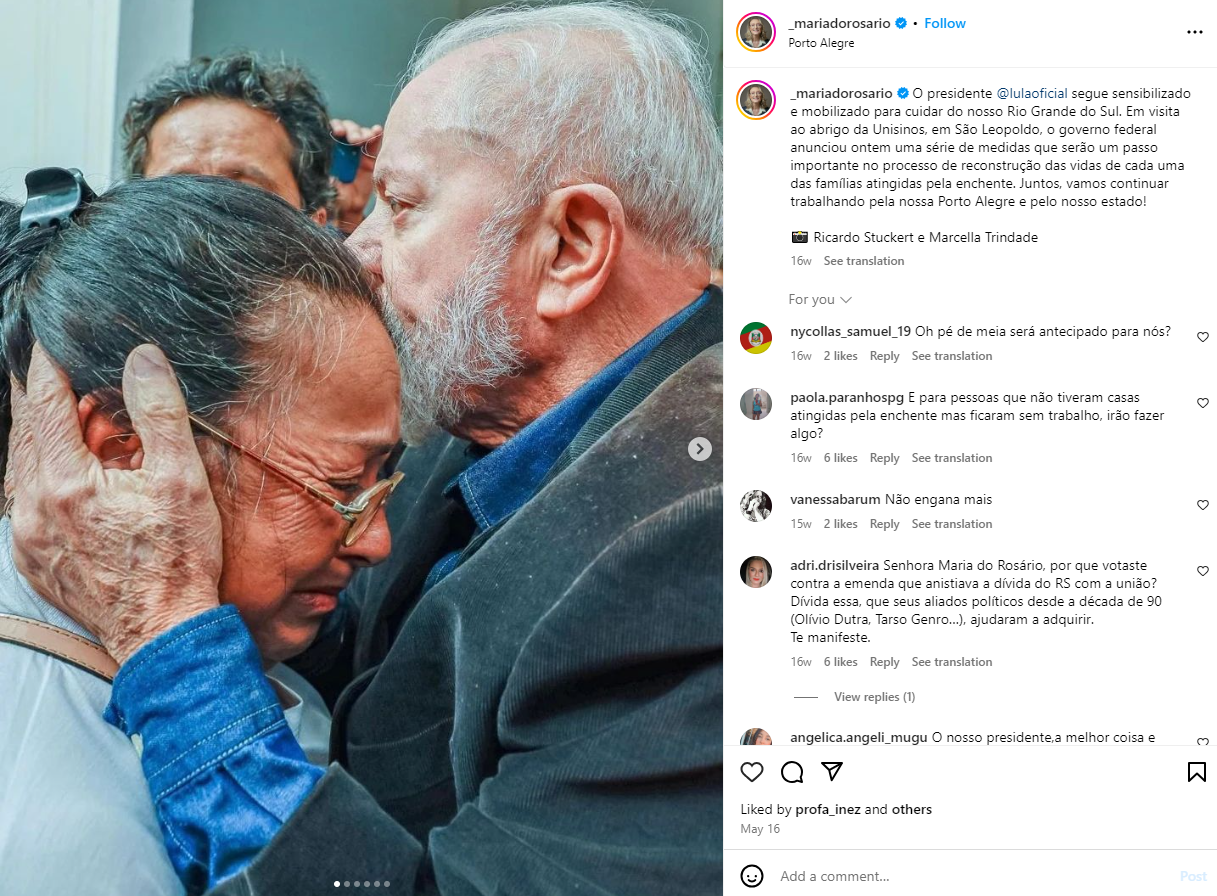
Post from Maria do Rosario on Instagram on 16 May 2024. Caption:
“President @lulaoficial continues to be sensitive and mobilised to take care of our Rio Grande do Sul. On a visit to the Unisinos shelter in São Leopoldo yesterday, the federal government announced a series of measures that will be an important step in the process of rebuilding the lives of each of the families affected by the flood. Together, we will continue to work for our Porto Alegre and our state!”
Data Source: Instagram Elaboration: Democracy Reporting International
______________________________________________________________
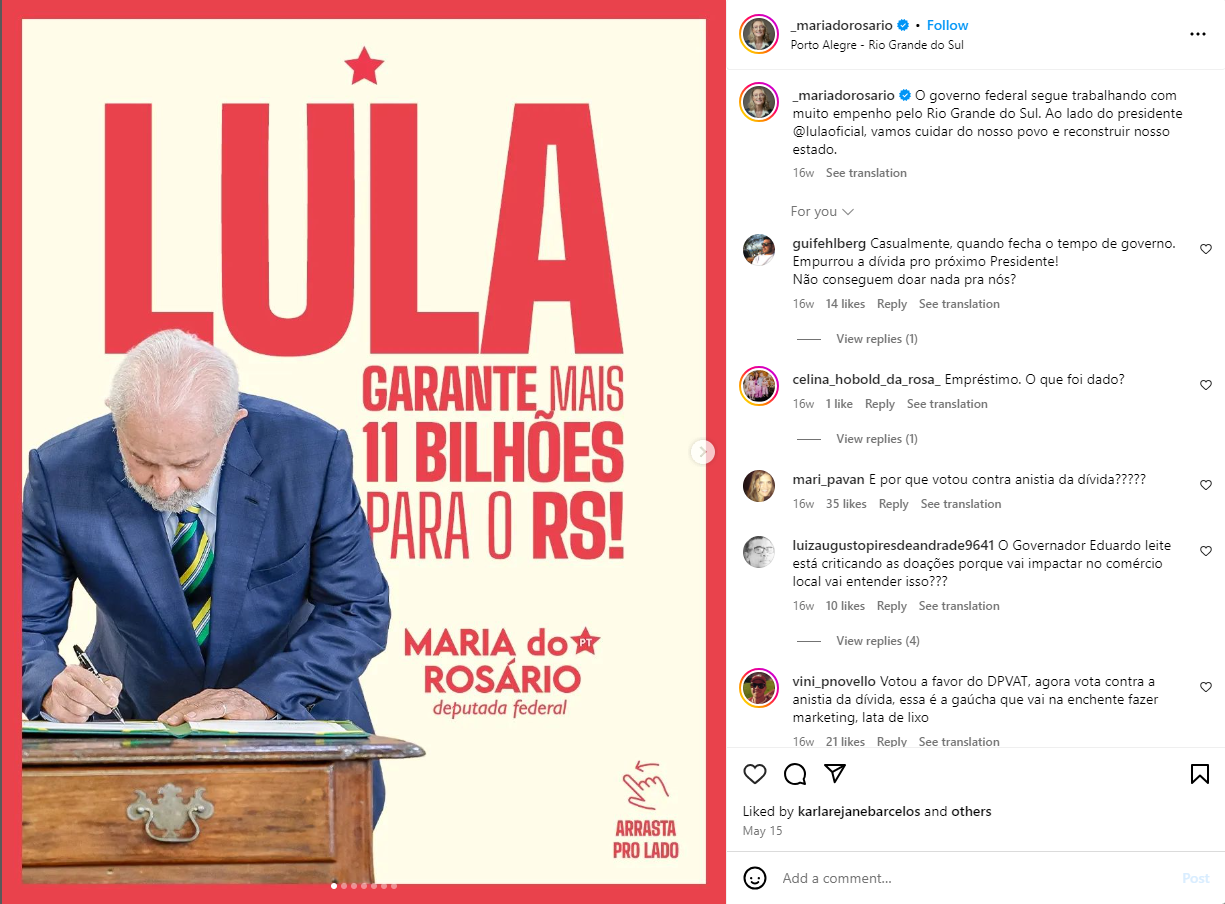
Post from Maria do Rosario on Instagram on 15 May 2024. Caption:
“The federal government continues to work hard for Rio Grande do Sul. Together with President @lulaoficial, we will take care of our people and rebuild our state.”
Data Source: Instagram Elaboration: Democracy Reporting International
______________________________________________________________
- On the other hand, Camozzato (Novo) took a critical stance towards the federal government in his posts, reflecting his opposition to Lula’s policies. His communication strategy in this category likely appeals to voters who are sceptical of or dissatisfied with federal interventions during the floods in Porto Alegre. Camozzato’s critique differentiates his platform by positioning him as a candidate offering an alternative to the status quo, distancing himself from the current government’s actions.
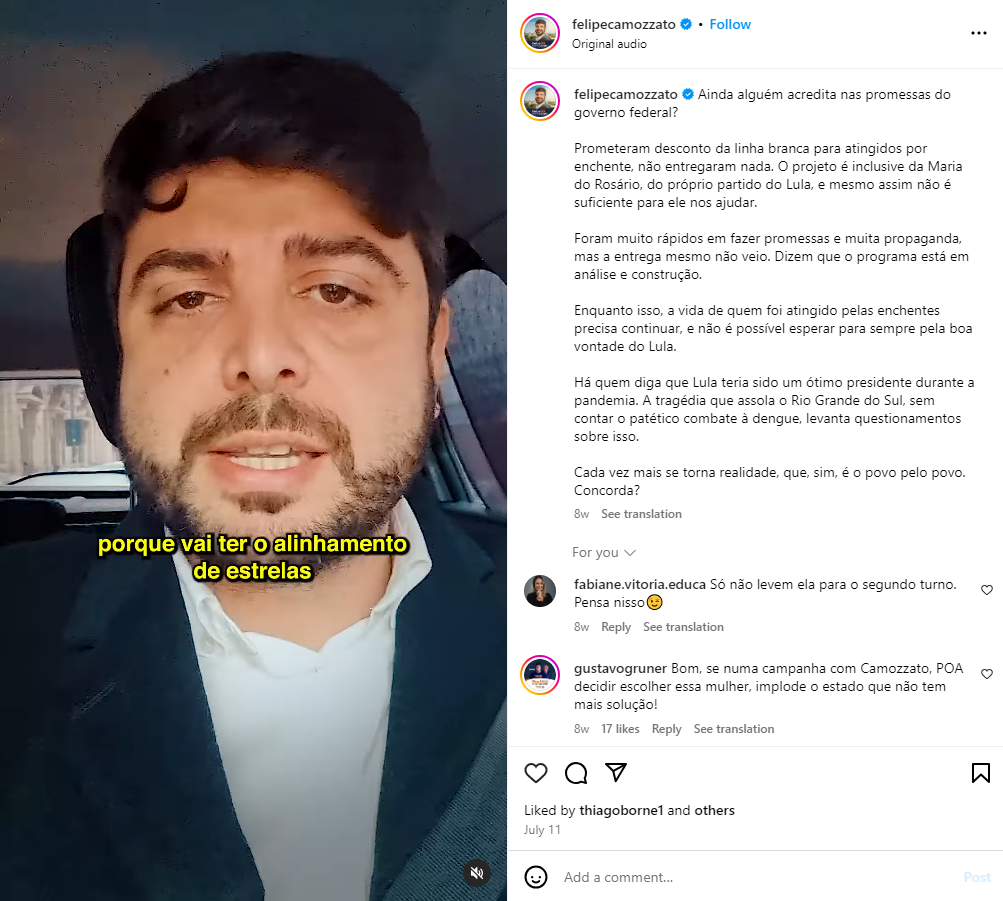
Post from Felipe Camozzato on Instagram on 11 July 2024. Caption:
“Does anyone still believe the federal government’s promises? They promised a discount on white goods for those affected by the floods, but they haven’t delivered anything. The project is even Maria do Rosário’s, from Lula’s own party, and even then, it’s not enough for him to help us. They were very quick to make promises and a lot of propaganda, but the actual delivery never came. They say the programme is under analysis and construction. In the meantime, the lives of those affected by the floods must go on, and it’s not possible to wait forever for Lula’s goodwill. Some say that Lula would have been a great president during the pandemic. The tragedy in Rio Grande do Sul, not to mention the pathetic fight against dengue fever, raises questions about this. It’s becoming increasingly clear that, yes, it is the people for the people. Do you agree?”
Data Source: Instagram Elaboration: Democracy Reporting International
______________________________________________________________
Climate Crisis in Porto Alegre
- The “climate crisis in Porto Alegre” was not prominent in most candidates’ posts. This indicates that direct attribution of recent floods and environmental disasters to global climate change is not central to their communication strategies.
- With 44 posts dedicated to this category, do Rosário stands out as the candidate most actively linking local environmental events to global climate change. Melo (MDB), Brizola (PDT), and Felipe Camozzato (Novo) had notably fewer posts in this category. Their limited focus could suggest a decision to concentrate on immediate, more tangible issues, rather than framing the floods within the broader context of climate change. Nonetheless, we still found posts by all candidates addressing the issue, but on a smaller scale than initially expected by the researchers.
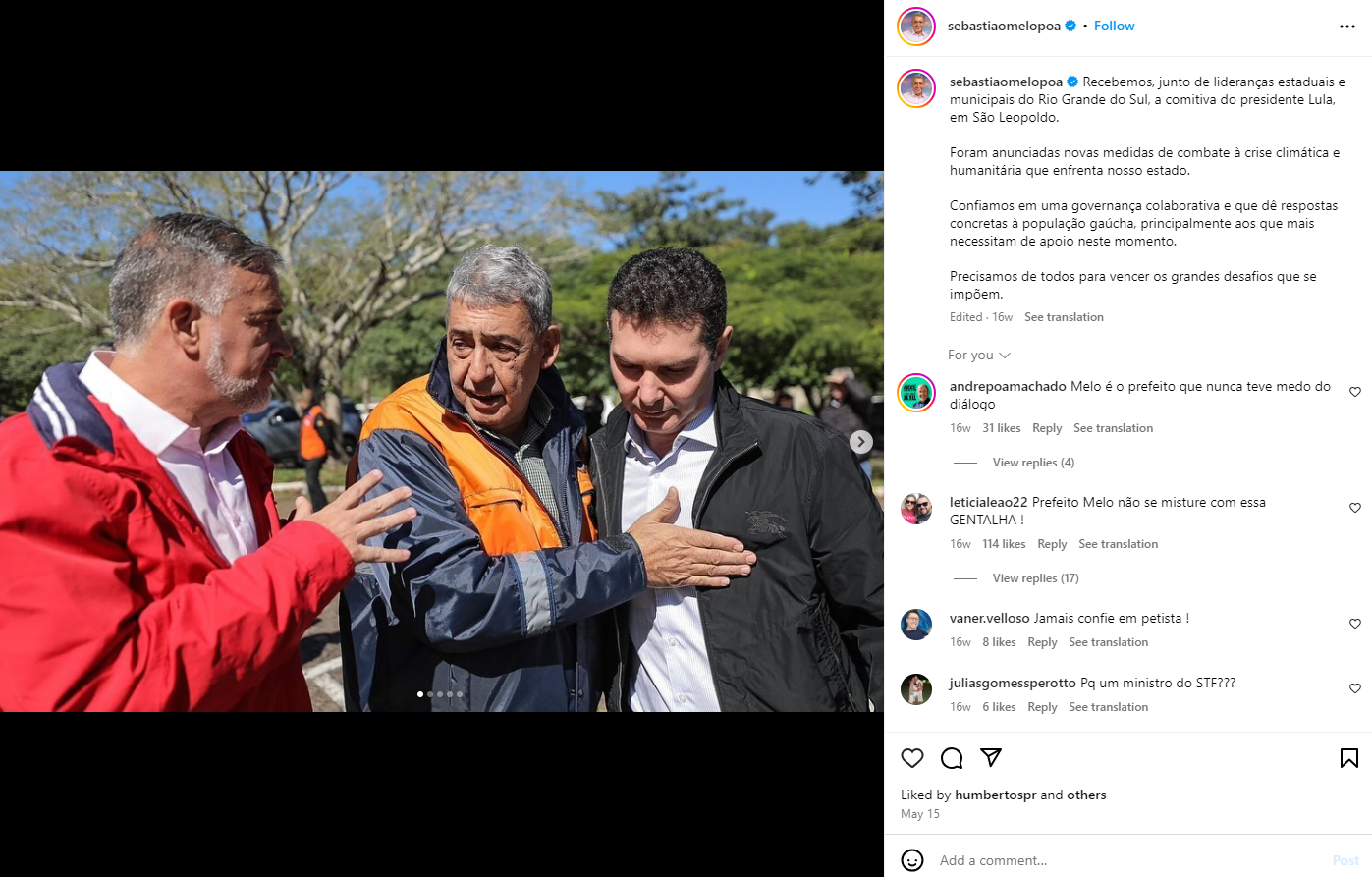
Post from Sebastião Melo on Instagram on 15 May 2024. Caption:
“Together with state and municipal leaders from Rio Grande do Sul, we received President Lula’s delegation in São Leopoldo. New measures to combat our state’s climate and humanitarian crisis were announced. We trust in collaborative governance that provides concrete answers to the people of Rio Grande do Sul, especially those who need the most support at this time. We need everyone to overcome the great challenges that lie ahead.”
Data Source: Instagram Elaboration: Democracy Reporting International
______________________________________________________________
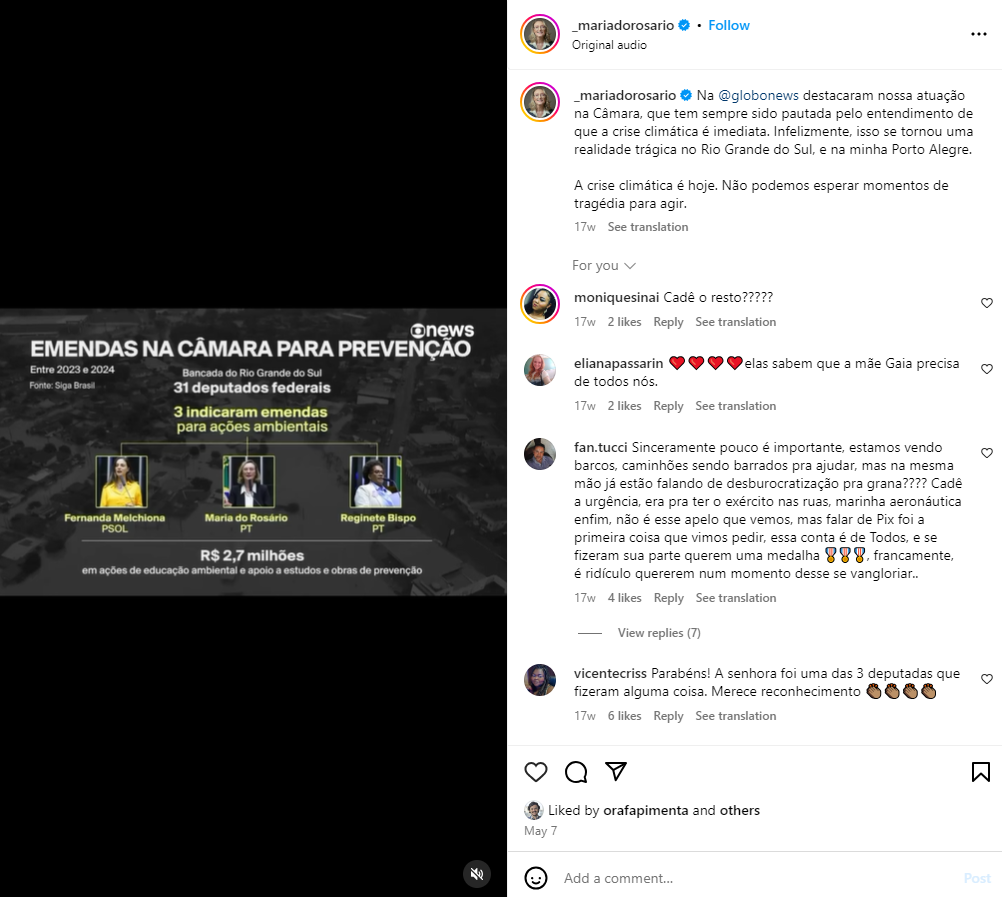
Post from Maria do Rosário on Instagram on 7 May 2024. Caption:
“On @globonews they highlighted our work in the Chamber, which has always been guided by the understanding that the climate crisis is immediate. Unfortunately, this has become a tragic reality in Rio Grande do Sul, and in my Porto Alegre.The climate crisis is today. We can’t wait for moments of tragedy to act”.
Data Source: Instagram Elaboration: Democracy Reporting International
______________________________________________________________
- This disparity in the focus of the candidates’ posts suggests a predominant avoidance of the broader climate change dialogue in favour of more immediate, tangible responses to environmental disasters. It indicates that most candidates opted to address the immediate effects of the floods and the urgent needs of the constituents, rather than engaging in a comprehensive discussion about long-term systemic climate challenges and policy innovations.
Flood Warnings and Public Security
- The four candidates did not often post about public security and flood warnings, suggesting that these topics are less central to their social media strategies. Apart from Melo (MDB), who had the most posts covering flood warnings – most likely due to his role as the current mayor – the candidates posted fewer real-time warnings to the population.
- Posts on “public security” discussed specific and necessary measures the local government should take – or had taken – to ensure the safety of displaced people, especially women and children, at public shelters. This was a topic of concern throughout the rescue and placement of the population in the shelters, and many women and children showed relief when the local government announced exclusive shelters.
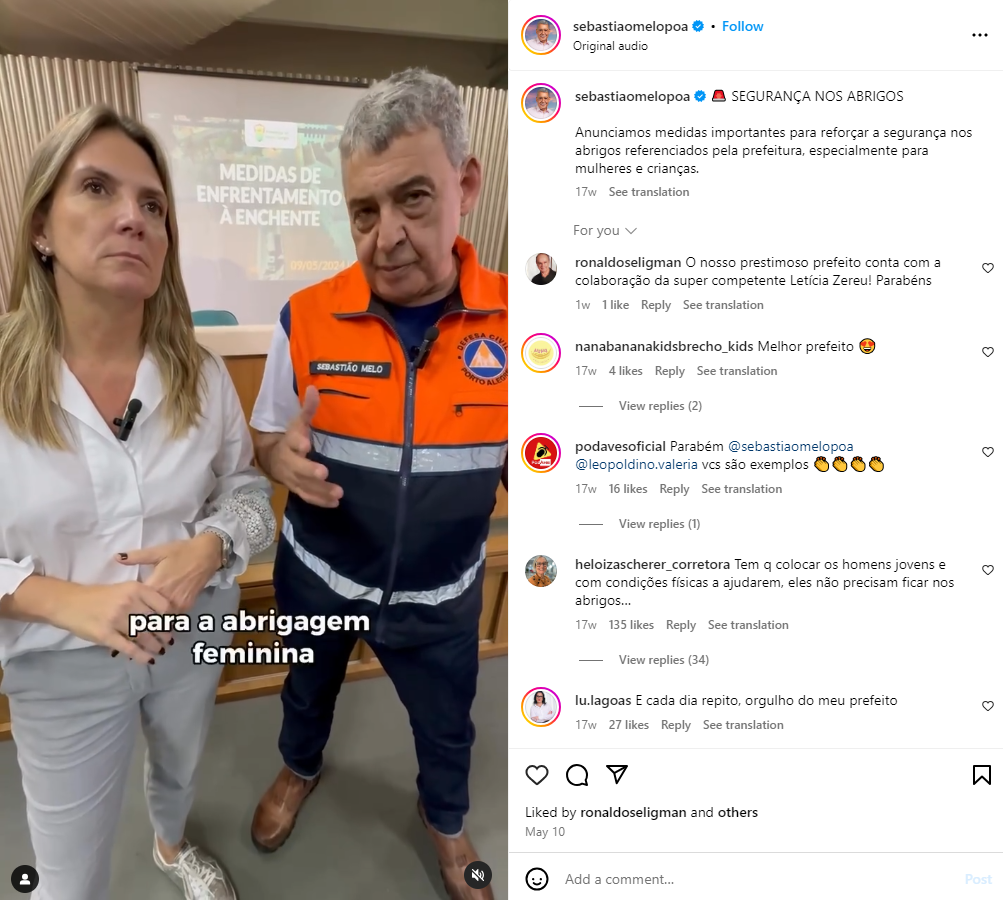
Post from Sebastião Melo on Instagram on 10 May 2024. Caption:
“’d83d’dea8 SECURITY IN SHELTERS We have announced important measures to reinforce security in shelters the city runs, especially for women and children.”
Data Source: Instagram Elaboration: Democracy Reporting International
______________________________________________________________
Engagement per Climate-Related Topic
- Graph 6 shows that posts about the “climate crisis in Porto Alegre, ” despite being fewer in number, generated the highest average engagement among all topics. This indicates that, while the volume of discussion around the broader climate issues was smaller, these posts resonated strongly with the audience, potentially due to the critical relevance of climate change discussions within the context of ongoing environmental challenges in Porto Alegre.
Graph 6: Volume of Posts by All Candidates in the First Two Weeks of the Election Campaign
Data Source: Instagram Elaboration: Democracy Reporting International
- “Solidarity and rebuilding the city” was the most frequently discussed topic, with the highest number of posts. It also generated high engagement levels, second only slightly to the broader climate crisis topic. This suggests a solid public connection and response to posts that focus on community rebuilding efforts and solidarity, highlighting the importance of these themes in the aftermath of the floods.
The First Two Weeks of Election Campaigning
- Between 16 and 31 August, the first two weeks of the official election campaign, candidates posted different volumes of content online. Do Rosário (PT) was by far the most active candidate on Instagram during this time, with 130 posts, more than double the number of posts by any other candidate.
Graph 7: Volume of Each Candidate’s Posts in the First Two Weeks of the Election Campaign
Data Source: Instagram Elaboration: Democracy Reporting International
- Although the first television debate dominated the online discussion of floods and climate-related issues, our data from the first two weeks of campaigning shows a different picture. Out of the total 275 posts the four candidates shared online, only 62 addressed the “floods and climate-related” topic.
Graph 8: Number of Posts per Topic per Candidate in the First Two Weeks of Political Campaign
Data Source: Instagram Elaboration: Democracy Reporting International
- In the first two weeks, Brizola (PDT) lead in the flood and climate-related posts category, with 27 posts. Before the campaign started, she shared significantly less than do Rosário and Melo ond these issues, suggesting that Brizola might now actively engage with the climate change narrative to emphasise this topic for her electorate.
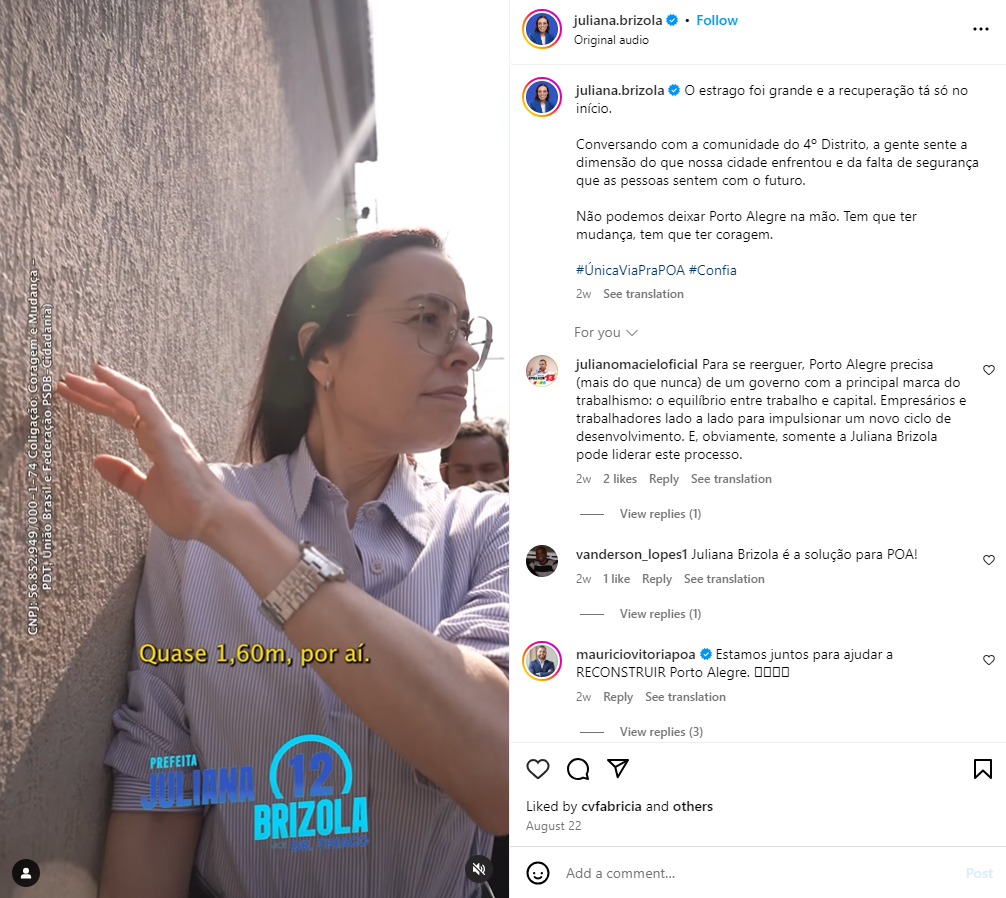
“The damage was great and recovery has only just begun. Talking to the community in the 4th District, we realise the scale of what our city has faced and the lack of security that people feel about the future. We can’t let Porto Alegre down. There has to be change, there has to be courage”.
Data Source: Instagram Elaboration: Democracy Reporting International
______________________________________________________________
About the Media and Democracy Project
The School of Communication, Media, and Information of the Getúlio Vargas Foundation (FGV ECMI) and the European Union (EU) have established a partnership to collaborate on strengthening Brazilian democracy and the integrity of digital spaces. The initiative, known as the Media and Democracy Project, will be conducted in collaboration with the fact-checking platform Lupa, “Democracy Reporting International” (DRI) the German centre for public debate analysis. The project focuses on debates concerning gender issues, racial inequality, minority rights, hate speech, and other important agendas in Brazilian politics. The project encompasses monitoring and analysis of digital media, fact-checking, and the establishment of a Council as a public space for promoting positive dialogue, involving researchers, civil society, representatives from the government, and platform stakeholders.
